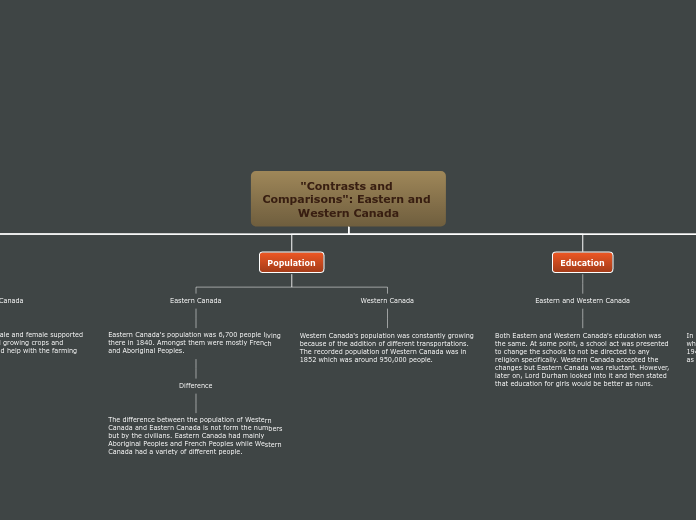"Contrasts and Comparisons": Eastern and Western Canada
Sources
Open Text BC
The Canadian Encyclopedia
Important Lands
One of the most important lands to the people of Western Canada was Rupert's Land, which was governed by Prince Rupert of the Rhine. Rupert's Land was held as the most important land in Western Canada because it is where the fur trading trappings are.
One of the best and most beautiful places in Eastern Canada is Niagara Falls. The falls in Niagara Falls are held as some of the most beautiful and exquisite attractions in Eastern Canada and perhaps Canada in general.
The difference between the most important land in Eastern Canada and Western Canada is that Eastern Canada's most important land is simply an attraction. Western Canada's most important land is an actual place where the Western Canadians got food from.
Indigenous People
In 1763, The British and the Indigenous Peoples made a treaty that the western side of the boundaries were known and Indian territories. This treaty was called "The Royal Proclamation". After the 7 year war, the British claimed the Indigenous peoples lands as their own, ignoring the treaty they had made long ago. They sold the land without the Indigenous People's consent.
Similarities
The one similarity between the way Eastern Canadians and Western Canadians treat Indigenous People is that Western Canadians originally had made a treaty and were willing to share the land but afterwards, they broke the treaty.
In Eastern Canada, the coming of the Indigenous People meant that all the work was to be split. The Huron-Wendat tribes were farmers and hunters while the people of Cree and Dene were hunter-gatherers.
The differences between the way Eastern Canadians and Western Canadians treated the Indigenous People is very big. The Eastern Canadians divided work between the Indigenous People and treated them kindly. Meanwhile, the Western Canadians did not treat the Indigenous People kindly and they did things without their consent.
Government
In 1839, Lord Durham created The Durham Report which was created to outline the Act of Union. In 1940, both Eastern and Western Canada were united as one area by Britain.
Education
Eastern and Western Canada
Both Eastern and Western Canada's education was the same. At some point, a school act was presented to change the schools to not be directed to any religion specifically. Western Canada accepted the changes but Eastern Canada was reluctant. However, later on, Lord Durham looked into it and then stated that education for girls would be better as nuns.
Population
Western Canada's population was constantly growing because of the addition of different transportations. The recorded population of Western Canada was in 1852 which was around 950,000 people.
Eastern Canada's population was 6,700 people living there in 1840. Amongst them were mostly French and Aboriginal Peoples.
Difference
The difference between the population of Western Canada and Eastern Canada is not form the numbers but by the civilians. Eastern Canada had mainly Aboriginal Peoples and French Peoples while Western Canada had a variety of different people.
Roles
In Western Canada, both male and female supported one another by farming and growing crops and wheats. Often children would help with the farming at home.
As told before, men's roles in Eastern Canada were to support their families by making money and doing different kinds of jobs. Women's roles in Eastern Canada were to stay at home and do cooking, cleaning, taking care of children and basic household needs.
Economy
Most of Western Canada's economy came from wheats and crops. People raised crops and then sold them to other people in order to raise money for their families.
A small merchant class was in charge of the economy in Eastern Canada. They controlled the timber, railway companies, trading houses, banks and all other companies in Eastern Canada.
Jobs
Eastern Canada
People of Eastern Canada divided the work between male and female. The men did work which ranged from blacksmithing, working in windmills, farming and fishing.
Western Canada
People in Western Canada did mainly farming and raised crops and wheats and then did business like that.
Differences
In Eastern Canada, there were a variety of jobs that could easily be divided between genders but in Western Canada, there was only one tactic on getting money to support families.

